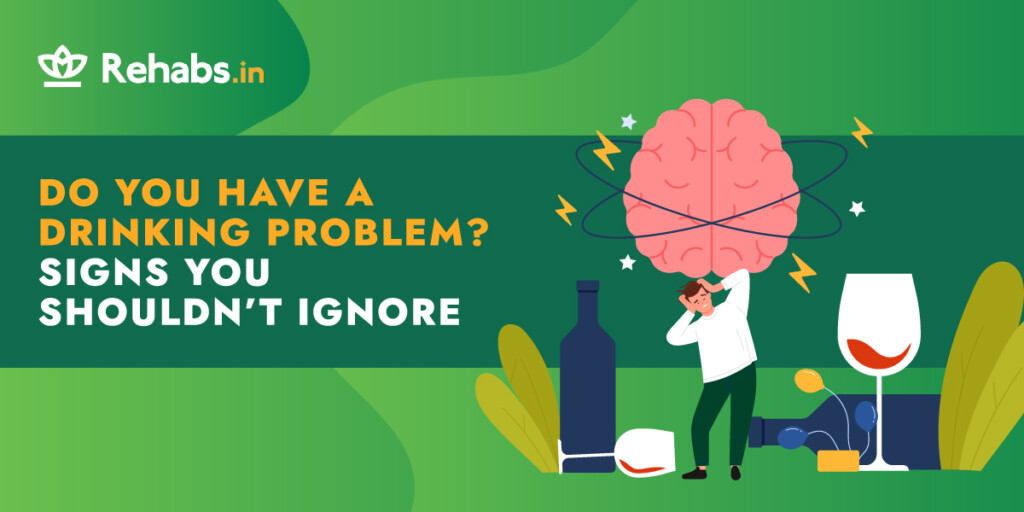Do You Have a Drinking Problem? Signs You Shouldn’t Ignore

Have you ever wondered if your drinking habits might be a cause for concern? In India, alcohol consumption has been steadily rising, with studies showing a 38% increase in per capita alcohol intake over the past decade. While social drinking is common and often culturally accepted, it can sometimes spiral into unhealthy patterns that are hard to recognise until they cause serious harm. According to a report by the World Health Organization (WHO), around 11% of drinkers in India engage in heavy episodic drinking—a behaviour linked to numerous health and social issues.
The truth is that the signs of a drinking problem can be subtle at first. It might start with having “just one more drink” after a long day or using alcohol to unwind in stressful situations. Over time, these behaviours can escalate, impacting your health, relationships, and daily responsibilities. Identifying these warning signs early is crucial, as untreated alcohol use issues can lead to severe consequences, including liver damage, mental health problems, and even addiction.
This blog is here to help you take a closer look at your relationship with alcohol. By understanding the signs of a drinking problem, you can take the first step toward making healthier choices for yourself or supporting someone you care about.
What Is Problematic Drinking?
Problematic drinking refers to patterns of alcohol use that negatively impact a person’s health, relationships, or ability to fulfil responsibilities. It goes beyond occasional or social drinking and often leads to physical, emotional, and social harm. Here’s a closer look at what constitutes problematic drinking:
Key Characteristics of Problematic Drinking
- Excessive Consumption: Drinking more than the recommended limits set by health guidelines, such as binge drinking or heavy episodic drinking.
- Loss of Control: Feeling unable to cut down or stop drinking despite efforts to do so.
- Dependence: Relying on alcohol to feel “normal” or cope with stress, anxiety, or other emotions.
Common Types of Problematic Drinking
- Binge Drinking: Consuming a large amount of alcohol in a short period, leading to intoxication.
- Heavy Drinking: Regularly exceeding safe drinking limits (e.g., more than 14 drinks per week for men or 7 for women).
- Alcohol Dependence: Experiencing cravings, withdrawal symptoms, or an inability to function without alcohol.
The Line Between Social and Problematic Drinking
For many people, enjoying a drink occasionally with friends or family is a normal part of social life. However, the distinction between social drinking and problematic drinking lies in the impact alcohol has on one’s life.
Problematic drinking begins when alcohol use starts interfering with important aspects of daily living, such as work, family responsibilities, or personal well-being. It often involves turning to alcohol as a way to cope with negative emotions or avoid dealing with challenges, which can create a harmful cycle over time.
Common Signs of a Drinking Problem
Recognising the signs of a drinking problem can be the first step toward taking control and making healthier choices. These signs often manifest in physical, behavioural, and emotional ways. While they may vary from person to person, the following are some common indicators that alcohol may be becoming a problem:
Physical Signs
- Increased Tolerance: You find that you need to consume more alcohol to achieve the same effects.
- Withdrawal Symptoms: Experiencing shaking, sweating, nausea, or anxiety when not drinking.
- Blackouts or Memory Loss: Forgetting events or conversations that occurred while drinking.
Behavioural Signs
- Drinking Alone or in Secret: Hiding alcohol use from others or drinking in isolation.
- Neglecting Responsibilities: Failing to meet commitments at work, school, or home due to alcohol use.
- Using Alcohol to Cope: Relying on alcohol to manage stress, anxiety, or other emotions.
- Risky Behaviors: Engaging in unsafe activities, such as driving under the influence or risky sexual behaviour, while intoxicated.
Emotional and Psychological Signs
- Feelings of Guilt or Shame: Frequently feeling bad about your drinking or hiding it from others.
- Inability to Cut Down: Struggling to reduce or stop drinking despite wanting to do so.
- Mood Swings or Agitation: Experiencing irritability, anxiety, or depression that may be linked to alcohol use.
Identifying these signs early can help you take proactive steps to address the issue before it escalates. If any of these resonate, it might be worth reflecting on your relationship with alcohol and seeking support from trusted friends, family, or professionals. Change is possible, and acknowledging the problem is the most important first step.
The Impact of Ignoring the Signs
Ignoring the early signs of a drinking problem can lead to severe and long-lasting consequences for your physical, emotional, and social well-being. Over time, excessive alcohol consumption can result in serious health issues such as liver damage, heart disease, weakened immunity, and an increased risk of certain cancers.
Mental health also suffers, as alcohol use often worsens anxiety, depression, and stress, creating a vicious cycle where drinking becomes both a symptom and a cause of emotional distress.
Beyond personal health, problematic drinking can strain relationships with family and friends, as erratic behaviour, neglect of responsibilities, and broken trust take their toll. Work and academic performance may also decline, with absenteeism, missed deadlines, or poor decision-making becoming more frequent. Socially, alcohol misuse can lead to isolation, financial troubles, and legal issues such as DUIs or public misconduct.
Left unaddressed, what starts as a manageable issue can escalate into alcohol dependence or addiction, making it harder to regain control. Recognising the signs early and taking action can help prevent these serious outcomes. Seeking help is not a sign of weakness but a powerful step toward reclaiming your health, relationships, and overall quality of life.
When to Seek Help
TL;DR: Seek help if alcohol interferes with your responsibilities, you can’t control your drinking, or you rely on it to cope with emotions. Warning signs include withdrawal symptoms, increased tolerance, and concerns from loved ones. Early support through therapy or groups can help you regain control and improve your well-being.
Knowing when to seek help for a drinking problem is crucial, as early intervention can prevent long-term damage to your health, relationships, and overall well-being. While occasional social drinking may not raise concerns, there are key indicators that signal it’s time to reach out for support.
If you’ve tried to cut down on drinking but repeatedly failed, or if you feel unable to control your alcohol intake, it may indicate a deeper issue. Using alcohol to cope with stress, anxiety, or other emotions is another warning sign, as this behaviour often leads to dependency over time.
Physical symptoms like withdrawal (shaking, sweating, or nausea) when you don’t drink or an increasing tolerance where you need more alcohol to feel the same effects are strong signs of alcohol dependence. Loved ones expressing concern about your drinking habits is also an important cue to reflect on your behaviour.
Seeking help is about prioritising your health and happiness. Whether through therapy, support groups, or medical treatment, resources are available to help you regain control and build a healthier relationship with alcohol.
Steps to Take if You Think You Have a Drinking Problem
- Self-Assessment: Reflect on your drinking habits using tools like the AUDIT questionnaire or a simple checklist to identify problem patterns.
- Talk to Someone: Share your concerns with a trusted friend, family member, or mentor for support and perspective.
- Seek Professional Help: Reach out to a counsellor or doctor, or join a support group like Alcoholics Anonymous for guidance and treatment options.
- Adopt Healthy Coping Strategies: To manage stress and emotions, replace drinking with activities like exercise, meditation, or journaling.
- Set Clear Goals: Commit to reducing or quitting alcohol and track your progress to stay motivated.
Taking the first step, no matter how small, can set you on the path to recovery and improved well-being.
Supporting Someone Else Who May Have a Drinking Problem
Supporting a loved one with a drinking problem requires empathy, patience, and clear communication. Approach the conversation with care, avoiding blame or judgment, and focus on expressing your concern for their well-being. Use specific examples to highlight how their drinking is affecting their lives and relationships and encourage them to seek help.
Acknowledging a problem can be difficult, so be prepared for resistance or denial. Offer practical support, such as helping them find resources like counselling, support groups, or treatment programs. At the same time, set healthy boundaries to protect your own well-being, and remember that their recovery is ultimately their responsibility. By showing compassion and providing steady encouragement, you can play an important role in their journey toward healing.
Conclusion
Recognising and addressing a drinking problem is the first step toward a healthier and more fulfilling life. Whether it’s identifying the signs in yourself or supporting a loved one, early action can prevent serious consequences and pave the way for recovery. Taking that first step might feel daunting, but it’s a powerful move toward reclaiming control and building a brighter future. Change is possible, and you don’t have to face it alone. To browse through a list of some of the best rehabs in India, click here.
Sources:
World Health Organization. (2018). Global status report on alcohol and health 2018. Geneva: World Health Organization. https://www.who.int/publications/i/item/9789241565639
National Institute on Alcohol Abuse and Alcoholism. (n.d.). Alcohol use disorder (AUD) in the United States. Retrieved January 8, 2025, from https://www.niaaa.nih.gov/
American Psychiatric Association. (2013). Diagnostic and statistical manual of mental disorders (5th ed.). Arlington, VA: American Psychiatric Publishing.
Substance Abuse and Mental Health Services Administration. (2020). Key substance use and mental health indicators in the United States: Results from the 2019 National Survey on Drug Use and Health. Rockville, MD: Center for Behavioral Health Statistics and Quality, Substance Abuse and Mental Health Services Administration. https://www.samhsa.gov/
Ray, L. A., & Bujarski, S. (2020). Alcohol use disorders: Clinical features and diagnosis. In K. E. Sullivan & S. H. Sobell (Eds.), Handbook of clinical health psychology (Vol. 2, pp. 205–220). Springer. https://doi.org/10.1007/978-3-030-11827-8
Patel, V., & Chatterji, S. (2015). Addressing mental health needs in low- and middle-income countries: The role of health systems. Journal of Global Health, 5(1), 1-7. https://doi.org/10.7189/jogh.05.010301














